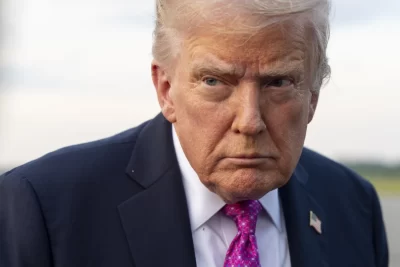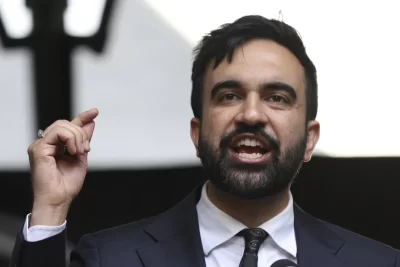
LONDON — The verdict of U.S. voters was more decisive than most pollsters and pundits had predicted. Now the world waits to see whether the election of Donald Trump as president for a second time will prove as destabilizing as many American allies fear.
Trump secured victory Wednesday when he surpassed the 270 electoral college votes needed to win. In a victory speech before the official declaration, he vowed to “put our country first” and bring about a “golden age” for America.
Trump’s first term saw him insult and alienate many of the United States’ longstanding allies. His return to the White House, four years after losing office to President Joe Biden, has huge consequences for everything from global trade to climate change to multiple crises and conflicts around the world.
Trump has pledged to ramp up a tariff feud with China, the United States’ growing economic and strategic rival. In the Middle East, Trump has pledged, without saying how, to end the conflicts between Israel, Hamas and Hezbollah. He has also vowed to end the Russia-Ukraine war within 24 hours of taking office – something Ukraine and its supporters fear would be on terms favorable to Moscow.
NATO is nervous and Ukraine is anxious
NATO Secretary-General Mark Rutte congratulated Trump, saying, “I look forward to working with him again to advance peace through strength through NATO” in the face of “a growing number of challenges globally,” including “the increasing alignment of China, Russia, North Korea and Iran.”
Trump was a strong critic of the North Atlantic military alliance during his first term, accusing its other members of failing to pull their weight. Earlier this year he said the United States would not defend NATO members that don’t meet defense spending targets.
Rutte emphasized the positive, praising Trump for his work persuading member states to ramp up defense spending and saying NATO was now “stronger, larger, and more united.”
America’s allies are — belatedly, some say — grappling with what to do if they cannot depend on the U.S. for their defense.
“The existential concern for Europeans has been what happens to Ukraine, what happens to Europe’s security, what happens to America’s commitment to NATO?” said Leslie Vinjamuri, director of the U.S. and Americas program at the think tank Chatham House. “Will America be there for Europe?”
The U.S. is by far Kyiv’s biggest military backer as it battles Russian invasion, though the Biden administration resisted pressure from President Volodymyr Zelenskyy to do even more. Zelenskyy, like Rutte, said he welcomed Trump’s “peace through strength” approach.
“This is exactly the principle that can practically bring just peace in Ukraine closer,” Zelenskyy wrote on social media. “I am hopeful that we will put it into action together. We look forward to an era of a strong United States of America under President Trump’s decisive leadership.”
No congratulations were forthcoming from Moscow, where President Vladimir Putin’s spokesman, Dmitry Peskov, declared that Russia-U.S. relations were at the “lowest point in history.”
European congratulations mask deep divisions
European leaders rushed to congratulate Trump even before his victory was officially declared — some more effusively than others.
British Prime Minister Keir Starmer called it a “historic election victory” and said that “as the closest of allies, the U.K. and U.S. will continue to work together to protect our shared values of freedom and democracy.”
Like governments of U.S. allies around the world, Starmer’s center-left administration has worked hard to forge ties with Trump and his team. Starmer had dinner with Trump at Trump Tower in September.
France’s centrist President Emmanuel Macron offered congratulations, “respect and ambition.” Social Democratic German Chancellor Olaf Scholz congratulated Trump and said he wanted continued close ties, even if “surely many things will be different under a Donald Trump-led administration.”
Italian Premier Giorgia Meloni, whose far right-led government is in some ways close to Trump politically, said Italy and the U.S. had a “strategic bond, which I am sure we will now strengthen even more.”




